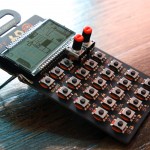 Yesterday I wrote about a study into the tremendous potential of open source manufacturing of scientific equipment. A good example for the scientific community to learn from is the Swedish company Teenage Engineering.
Yesterday I wrote about a study into the tremendous potential of open source manufacturing of scientific equipment. A good example for the scientific community to learn from is the Swedish company Teenage Engineering.
They first came to the fore back in 2011 with the launch of the OP-1 synthesizer, sampler and sequencer that became a hit in the music industry.
When they experienced difficulties shipping supplies and spare parts to customers, they decided upon an innovative workaround. Rather than manufacture the parts and then look to ship them, they sent out the CAD files onto Shapeways so that customers could print their own parts and accessories.
Printable parts
They’re possibly the first company to adopt such an approach, and the merits are clear. Not only does it radically reduce storage requirements and distribution costs, it also opens up the world for customization of the product by customers.
This is especially important in creative industries such as music where customers crave flexibility but the high cost of unique equipment would normally prohibit it.
A modular approach
The company have gone further down this road with the launch of their latest product. The Pocket Operators synthesizer is a pretty basic service that is a fraction of typical synthesizers.
It comes with an exposed circuit board that allows for users to expand on the devices capabilities easily and affordably.
Pretty much all aspects of the device are customizable, and the company release both measurements and CAD files to support customers that wish to hack the device.
Suffice to say, this is something of an outlier as far as how manufacturing is traditionally performed, but it provides a tantalising glimpse into a possible future.
I don't know about these, but the OP-1 is really nothing to gawk at.